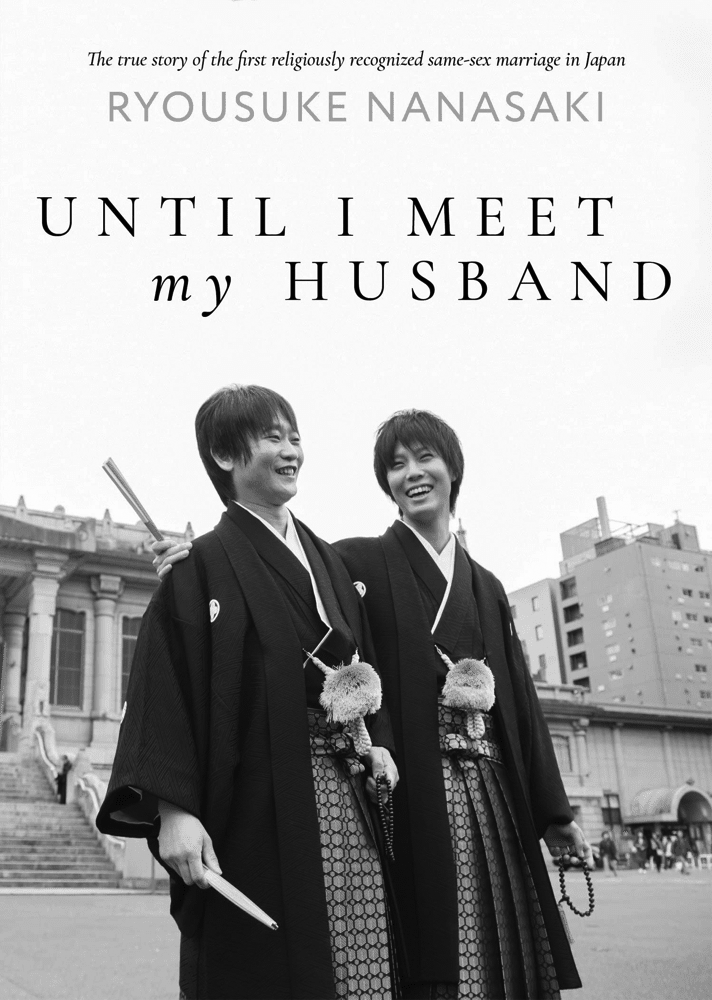Struggle, Sex, and Self-Acceptance
by Blair E. Vandehey
In 2016, the first religiously recognized marriage between two members of the same sex made history in the conservative country of Japan. What sorts of twists and turns led to this monumental event? Ryousuke Nanasaki, one of the grooms, unashamedly retells the story of navigating through life as a gay man in Japan and all the hardship, heartbreak, and happiness it entailed in his memoir Until I Meet My Husband.
Before the formal review begins, I want to take a moment to acknowledge the empathy with which Molly Lee translated Nanasaki’s memoir into English. Whenever a work of literature leaves a language to be written into another, there is potential for the nuance the original author painstakingly crafted to be lost in translation. This is especially true with raw works like Nanasaki’s. Lee, however, succeeds in making the barrier as small as possible; her careful storytelling flows smoothly and empathetically, and her personal style is largely absent from Nanasaki’s work. Her translation feels so natural that one could have told me the English version was the original draft Nanasaki wrote, and I would have believed it.
Until I Meet My Husband begins with Nanasaki in elementary school and continues until his decision to publish his story. However, before he takes the reader back to the hardships of his youth at the end of the prologue, he opens with an account of the day he married his husband, structuring his work with the resolution before even the first chapter. Although he reveals the conclusion before the work even begins, Nanasaki leaves us hungry for answers; how did he get from such a lonely, discouraged childhood to his proud, fulfilled present? Nanasaki does not center his narrative on where he was headed but how he got there.
The chapters begin, and it becomes obvious that the work is a roller coaster of emotions. An admirable skill he possesses is the ability to separate Nanasaki the author from Nanasaki the speaker. The former knows what will happen, while the latter does not. In assuming his ‘speaker’ persona, Nanasaki embodies the young and naïve version of himself while narrating, as clueless to his future as the reader. Even though I knew who he married from the end from the prologue, so many times I found myself saying, “He’s the one!” along with ‘speaker’ Nanasaki, only to have my heartstrings tugged at as we were proven wrong by the author. To describe Nanasaki’s skill to distinguish author from speaker as a potent weapon would be a dramatic understatement.
When reading a memoir, it is natural to sympathize with the speaker — the reader only gets to learn their side of the story, after all. That said, this one-sided context can lead to a closed mindset; the reader may fall into the trap of believing the speaker they have come to know is entirely innocent of wrongdoing. Nanasaki, however, does not try to play himself as ‘in the right’ when he knows he was not. He is unafraid to tell the truth as it was, even if it makes him out to be the bad guy. In his epilogue, he even explicitly acknowledges his misgivings and encourages the reader to detest him for them when deserved. Rather than becoming an unlikable speaker, Nanasaki’s acceptance of his own ills makes him into a human speaker, undeniably flawed but undeniably authentic.
Authenticity defines both Nanasaki’s narrative and his style of writing. This is especially true when he addresses scenes of sexuality, by which I mean everything from his awkward first time to one-and-done hookups. Even today, many authors of LGBTQ+ narratives tend to self-censor moments of intimacy within their work – something authors of heterosexual canon have never needed to worry about. Stigma surrounding sexuality in LGBTQ+ individuals is often reproduced by what is not said rather than what is. Nevertheless, Nanasaki was not afraid to break out of that box; after all, many pivotal moments in his journey to self-discovery are embedded within intimate encounters. He doesn’t shy away from raw descriptions of impromptu one-night stands or carnal make-up sex and doesn’t depict them as something taboo – they are simply his experiences that he now discloses to us. From cover to cover, Until I Meet My Husband’s masterfully crafted English version shamelessly retraces Nanasaki’s story riddled with struggle, sex, and — most importantly — the self-acceptance he found within.

Until I Meet My Husband
Ryousuke Nanasaki
Translation: Molly Lee
282 p., Release date: June 21st, 2022




